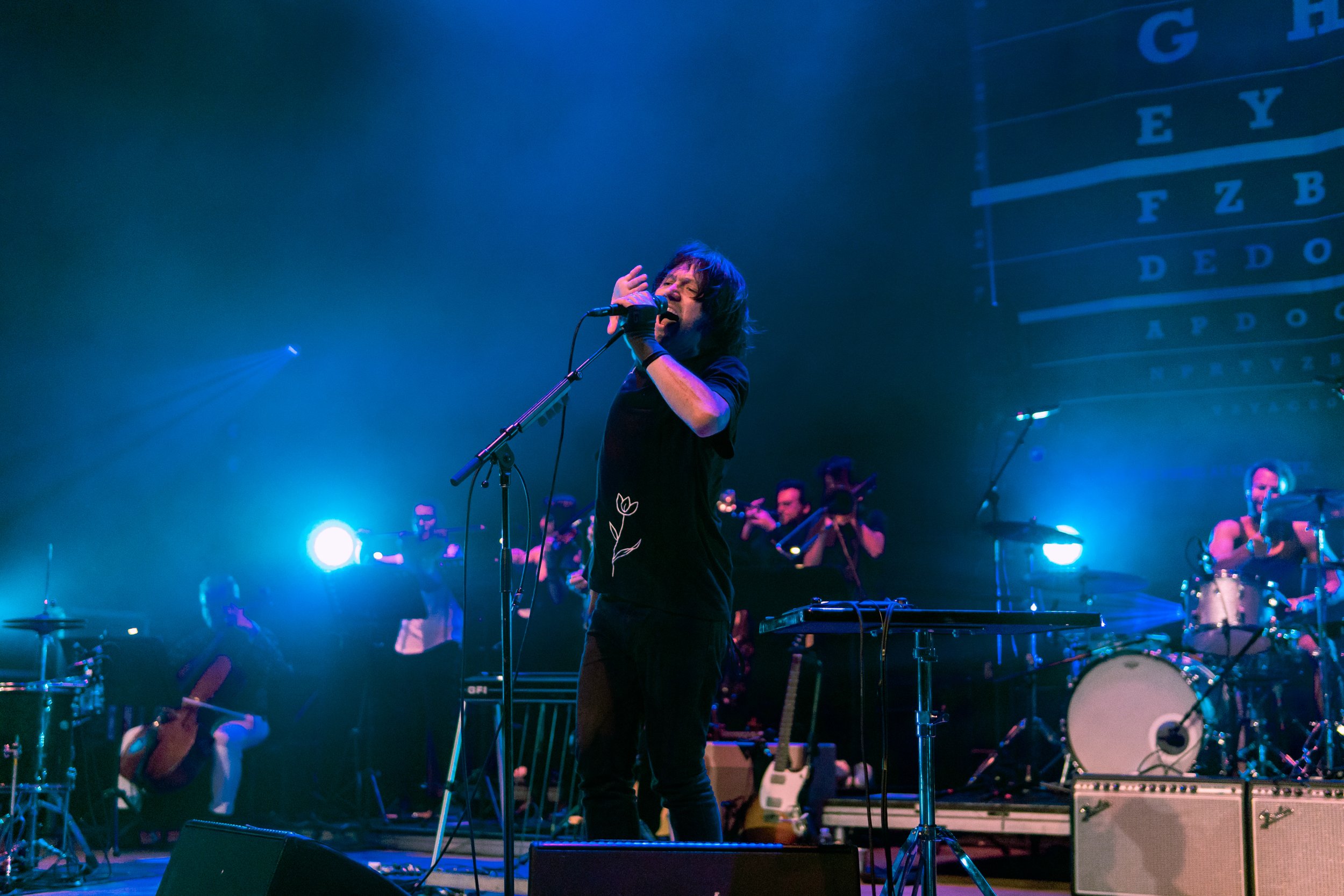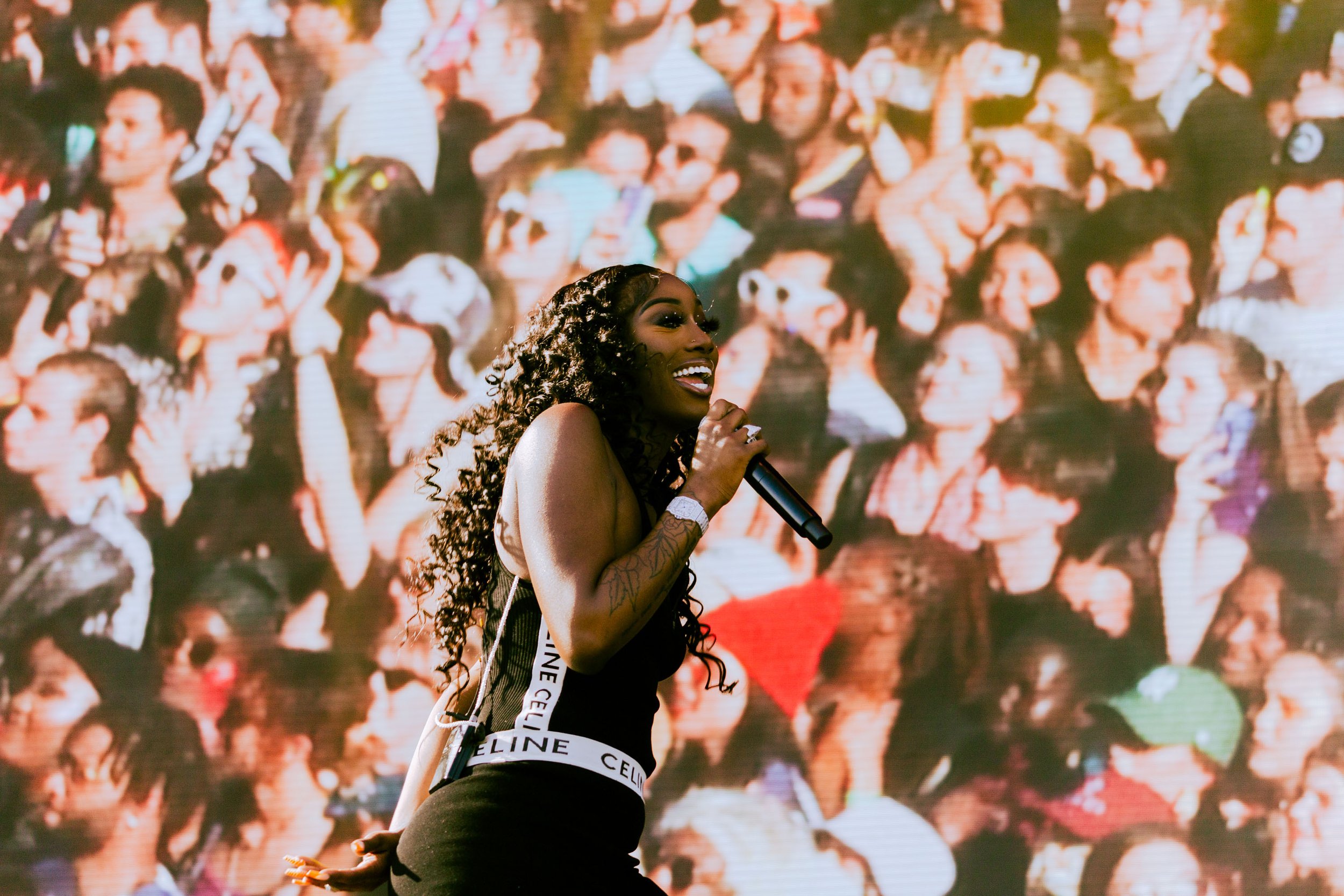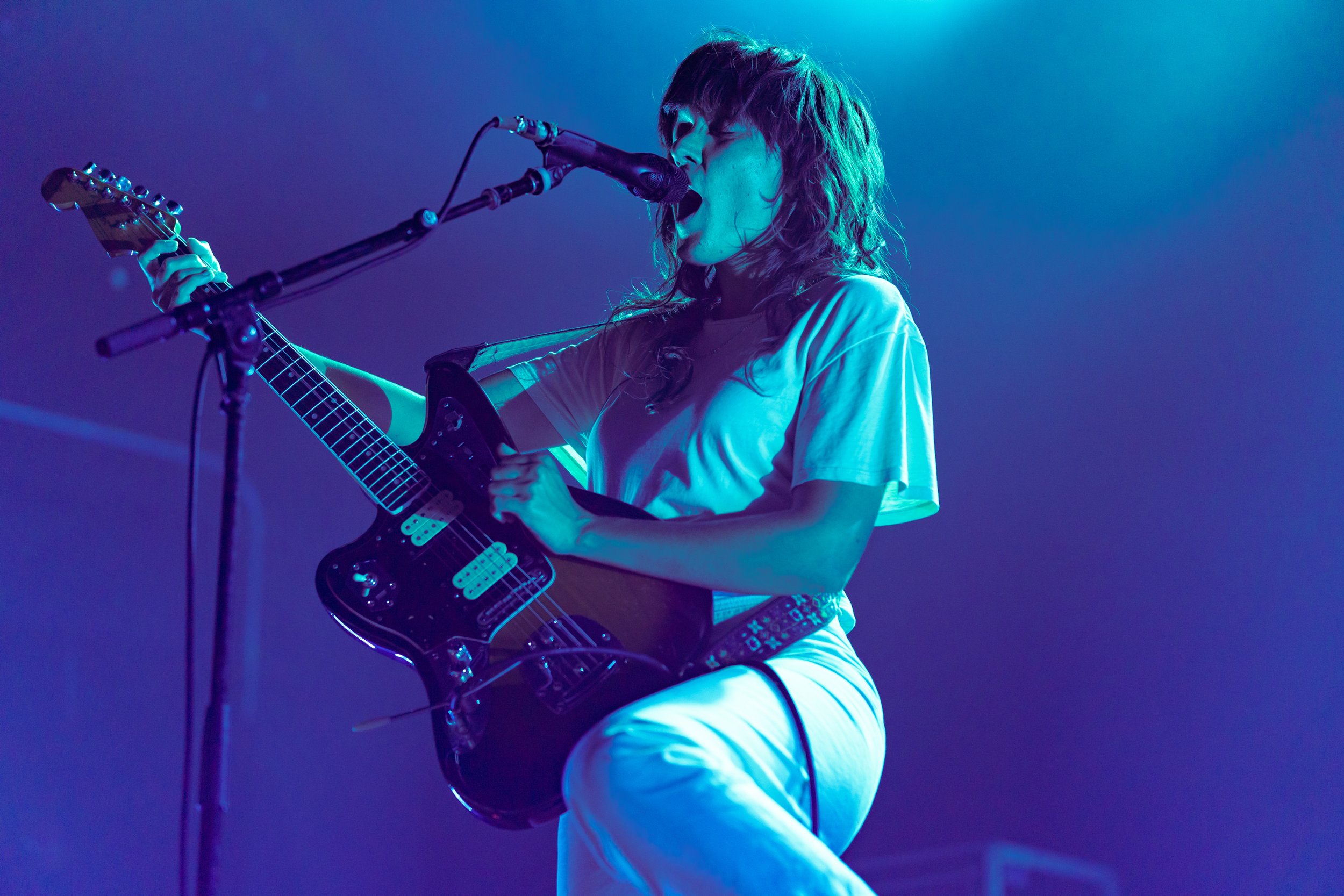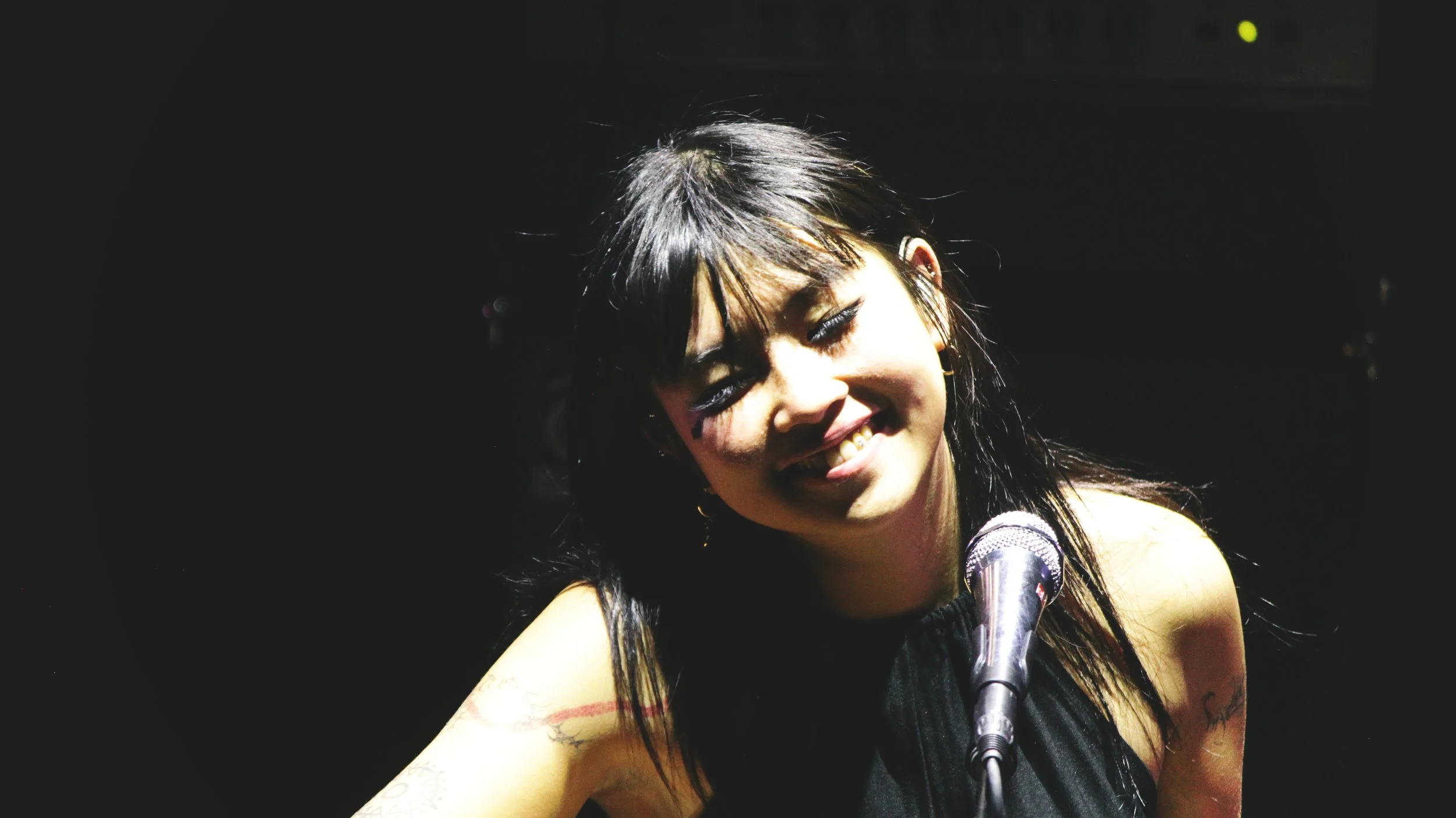Oberst a Rock Star when Bright Eyes Played New Orleans' Orpheum

Bright Eyes’ Conor Oberst at The Orpheum, by Victoria Conway
Frontman Conor Oberst blood-let his emotions and gave the show of a lifetime last Monday night
Watching Conor Oberst perform at the Orpheum Monday was like witnessing a black star exploding. The frontman of Bright Eyes walked around the stage, fist balled, with the energy of someone about to throw the first punch. He beat on his acoustic guitar like any moment he could take it off and smash it. Black brace on left wrist, dangly earring in right ear, Oberst looks like someone who all of a sudden turned 40. He’s a living conduit of early Aughts angst, and at the same time, a real person with fucked up, contradictory tendencies.
Oberst would definitely scoff at my romanticization of him. He’s a genius who would make fun of you for calling him a genius. He’s a genius who’s pretentious yet does not realize his own brilliance. As he spins around the stage, microphone shaking in hand, voice quivering, mouth spitting, arms flailing and conducting the orchestra and horns behind him, I realize he’s the closest thing to a rock star that we have.
Bright Eyes had been on an unofficial ten-year hiatus until 2020. Near the end of that time, the indie rock group teased the first single for its tenth upcoming studio album, Down In The Weeds, Where the World Once Was when the pandemic hit, and it felt like the apocalypse was really kicking off. Bright Eyes has always been known for its flair for melodrama. It was the nucleus of the early 2000s emo folk movement.
Oberst isn’t afraid to scrutinize the horror of the present moment. He has humiliated bullshit presidents on national television. He’s the first person to bring up death at parties. At a time when US government structures were clearly and morbidly failing its people, and death seemed to hang over all of our heads, a Bright Eyes return meant something. This album meant something.
Last Monday morning, Oberst was in all of the online headlines for walking off the stage in Houston after two songs the night before. It’s been an erratic tour for Bright Eyes. At one of the first stops, Oberst fell off the stage in Detroit, breaking his wrist. At other shows, he’s reportedly cut off the band from starting songs to tell long, rambling stories that are semi-unintelligible. A lot of fans have called for the tour to stop. Oberst needs help they said, and some found it unbearable to watch.
I didn’t know what to expect Monday night at the Orpheum. It was the first time Bright Eyes had a New Orleans stop on their tour in over a decade. Most of the crowd was in their late twenties and thirties. Converse seemed to be the uniform. A dude who looked like Michael Cera wearing a “Welcome to Asbury Park” Springsteen shirt stood next to me. 40 year-olds with IPAs in hand poked out of the crowd here and there. Everyone went crazy for hometown hero Hurray for The Riff Raff, and as openers, they set a high bar.
Hurray for the Riff Raff, by Victoria Conway
When the lights went dark, the sound of violent wind shook our eardrums. Violin bows and brass instruments glinted like swords under the electric blue that flooded us. Eerie voice overs cut through the noise, and it felt as if ghosts were spinning around the room, the River Styx taking us all deep down into the underworld. Oberst walked onto the stage to the sound of what could have been buildings falling. The strings rose to their highest peak, engulfing us in warmth, and then silence. “Got to keep on going like it ain’t the end / Got to change like your life is depending on it,” Oberst half-shouted, half-quivered, putting his full chest into it.
He performed like he was going to die tomorrow. Every movement was charged with energy. The band played like they were trying to keep Oberst on stage, and it worked.
He mimed every lyric. He ran to the front of the stage just to fall to his knees. He pointed at the ceiling, his voice breaking, screaming. He danced like Joaquin Phoenix as the Joker, and it was often incredible and sometimes terrifying. As he strutted across the stage, eyes down, determined, unafraid of hard work, you got the feeling that it was a feat that life hadn’t killed him yet.
Oberst has a swollen heart. It’s apparent in his lyrics, in his shaky voice and his vulnerable demeanor. It’s hard to keep on living when you’re a big feeler. He struggles, and we bear witness to that. Oberst isn’t trying to numb the pain with his music. He’s not even trying to come to a great conclusion or explanation for it all. He just wants to experience it and come out the other side.
A man behind me in a neon orange construction shirt lost his mind as Oberst strummed the opening chords of “Poison Oak,” a song that will run your heart over with a semi-truck. “You said you weren’t afraid to die,” the audience sang, turning the pre-chorus into a church service. “In Polaroids you were dressed in women’s clothes / So who made you ashamed, why’d you lock them in a drawer? / Well, I don’t think I ever loved you more,” Oberst sang as the audience held their breath for the chorus. “Than when you turned away, when you slammed the door / When you stole the car, and drove towards Mexico / And you wrote bad checks just to fill your arm / I was young enough, I still believed in war,” everyone sang over Oberst’s acoustic guitar playing.
It was one of those moments that reminded me of what music can do to you. The places a song can take you, the scenes that flash before your eyes, the lyrics that introduce you to a person, and then steal them away forever. Bright Eyes music centers around loss. It traces the big holes in our hearts, the shapes that people leave when they’re gone and we’re still here left on earth.
Oberst doesn’t turn away from absence, but stares down its voidless face. As everyone's voices rose and fell with the music, the Orpheum ceiling glittering, the lights illuminating us all, it made sense. Life is long, and grueling. But music is there so that you will never go through it alone.







